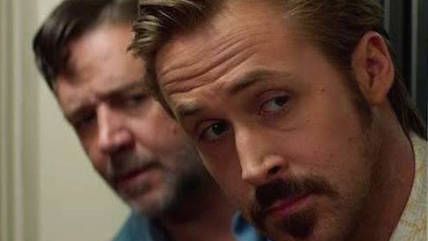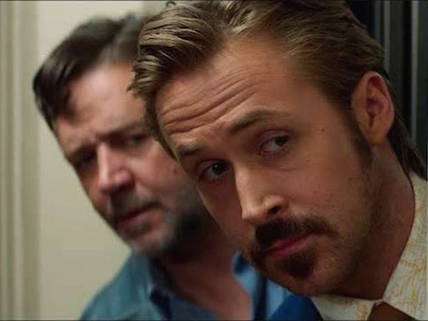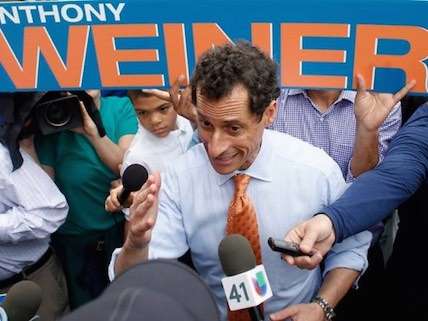Movie Reviews: The Nice Guys and Weiner
Buddy-flick magic with Russell Crowe and Ryan Gosling, and the crash-and-burn of a sex-crazed congressman.


Of all the year's movies that are not Deadpool, The Nice Guys might be the funniest. Well, it's one of them. This is a tribute to the film's stars, Russell Crowe and Ryan Gosling, who here display the loose, instinctive chemistry of previously unacquainted siblings who've just discovered a comedy blood link.
The rest of the movie has problems. In updating Raymond Chandler's lowlife Los Angeles to the garish 1970s, the picture recalls the famously muddled plot mechanics of Chandler's The Big Sleep—it's sometimes baffling, and it doesn't seem to care. It's also too long and, toward the end, too action-crammed. But director and co-writer Shane Black is a buddy-flick master (he wrote Lethal Weapon way back in the day, and later gave us Kiss Kiss Bang Bang), and Crowe and Gosling barrel past the film's deficiencies as if they were roaring down the PCH in a '77 Firebird.
Crowe's Jackson Healy is a freelance thug, a specialist in the bone-breaking arts. He's divorced and bitter about it. ("Marriage is buying a house for someone you hate.") Gosling's Holland March is a down-market private investigator, a dim widower whose 13-year-old daughter Holly (sparky Angourie Rice) has to drive him around on those frequent occasions when he's too drunk or hung over to take the wheel himself. March thinks he's a smooth operator, but he's so wrong.
The story is launched with the wild car-crash demise of a porn star named Misty Mountains (Murielle Telio, rating a rare topless death scene). March is hired to find Misty's friend Amelia (Margaret Qualley), who's also involved in the porn business. Healy has been hired by Amelia to prevent March from doing that, and after demonstrating his arm-cracking talent on the wimpy PI, it looks as if he's succeeded. But as is often the way in buddy world, Healy then joins forces with March to find the missing Amelia, and soon they're ducking bullets, stumbling over dead bodies, and wandering through a breast-heavy bacchanal in the Hollywood Hills. There are also boob-flaunting mermaids, a skin flick with a social message, and an unexpected appearance by the Detroit auto industry. And before long Healey and March are joined by Amelia's mom (Kim Basinger), a justice department official who's super-desperate to get her daughter back, and by an icy assassin called John Boy (Matt Bomer), who would clearly enjoy killing people even if he didn't get paid for it.
Crowe, who put on 50 pounds to play the sweet-but-lethal Jackson Healy, slips into the role as if it were a comfy old sneaker. But Gosling is a revelation. He has a ton of fun with the movie's slapstick scenes (hilariously overcome by the complexities of a bathroom-stall door at one point) and employs a perfectly measured delivery of its clueless zingers (to a cop who has detained him: "You know who else was following' orders? Hitler").
The movie ends with the unmistakable suggestion of a sequel—not always a welcome notion. In this case, though, it's hard to imagine anyone who wouldn't be instantly onboard for one.

Weiner
Among the many mistakes made by Anthony Weiner—onetime Democratic congressman, prince of political dick pics, and present-day punchline—was the one he made in 2013, which can now, with the release of Weiner, be seen to be major.
Two years earlier, Weiner was revealed to have sent a self-shot photo of his "bulging underwear," as the press gleefully called it, to a female college student, from his personal Twitter account. Weiner tried to finesse this situation ("I don't want to say with certitude…"), but was soon compelled to resign his office as a New York representative. However, his humiliated wife—Hillary Clinton adjutant Huma Abedin, who had just given birth to their first child—stood by her idiot, and the scandal slowly subsided.
By 2013, Weiner was ready to return to the political ring, mounting a campaign for mayor of New York City. And here is where he made that major mistake. Approached by a former chief of staff, Josh Kriegman, with an idea to chronicle his comeback in a fly-on-the-wall documentary, Weiner—a man who worships at the altar of his borzoi image—said sure. But the comeback collapsed with the revelation that there were other women, and that he had sent out even more explicit photos (of the Weiner wiener in all its undraped glory) along with occasional verbal endearments ("Baby, you'd be crawling for the door to prevent me from fucking you silly"). These lusty communications were dispatched from the account of someone calling himself "Carlos Danger," a ruse that was quickly exposed.
At this point, any normal person—which is to say, anyone who was not Anthony Weiner—could have told Kriegman and his co-director, Elyse Steinberg, to pack up their cameras and disappear. But Weiner didn't. He let them keep filming, and the result is this jaw-dropping film, a huge gift to savorers of Schadenfreude and to haters of scumbag politicians generally. Surprisingly, though, the picture is more than just a head-kick to a man who's already down for the count. It also has an unexpected emotional undertow; and by the end, along with being astonished by Weiner's towering egocentricity, we're also unexpectedly moved by something else.
At the picture's beginning, we see Weiner preening and posing and ranting on the floor of the House, fighting for justice for the little people, the always endangered "middle class." As the first scandal erupts, we see him hounded by the press and battered by tabloid headlines. (New York Post: "Battle of the Bulge." The Daily News: "He's Got Some Balls.") It's pretty ugly, but endurable.
When the second scandal breaks, we see reporters swooping in for the kill. But Weiner can never say no to media face time, and he keeps engaging—even as one of his tweet-pals, an aspiring porn actress called Sydney Leathers, arrives in New York to confront him for the delectation of the press (a wonderfully delirious sequence). In one incredible scene, we see Weiner alone in an MSNBC studio doing a remote interview with Lawrence O'Donnell, who's in Washington, D.C. O'Donnell is blunt: "I think there is something wrong with you," he says. Weiner, losing it entirely, fires right back: "Maybe I'll come on this show and kick your ass every night." Later, at home with Huma, we find Weiner giggling over a replay of this exchange, feeling it demonstrates his quickness of wit. Huma, a virtuoso of body language, is clearly reaching the end of her marital tether.
In her travels with Hillary Clinton, Huma Abedin projects a chilly image. Here, though, our heart aches for her. She's trapped, along with her one-year-old son, Jordan, by a man of whose deeply twisted nature she had evidently never been aware. Weiner bottoms out on the day of the mayoral election. Unable to persuade the fed-up Huma to play her usual role of political prop and accompany him to the polling station, he instead drags little Jordan along, and we soon see him regaling a pack of clamoring reporters as the boy breaks down in tears.
Does Weiner learn anything from all of this? On his way to coming in last in the mayoral election, he says, "I wonder if I had more time, if I could rebound again?" Obtuseness springs eternal.


Show Comments (39)